
Columbia University graduate and Palestinian activist Mahmoud Khalil reunited with his wife and met his newborn son after being released from over 100 days in ICE detention. After flying from Louisiana to New Jersey, Khalil told reporters, “If they threaten me with detention, even if they would kill me, I would still speak up for Palestine.” Khalil was the first arrested, on March 8. He is a legal permanent resident of the United States with a green card. His wife, Dr. Noor Abdalla, a U.S. citizen, was eight months pregnant at the time. Mahmoud played a prominent role in the Palestine solidarity protests at Columbia University last spring. Watch a special report from Democracy Now! from the Newark Airport.
Transcript
AMY GOODMAN: We’re at Newark Airport, and we’re waiting for Mahmoud Khalil to come out. He has just landed. His plane was diverted to Philadelphia, then took off again, is at Newark. Right now he’s playing with his baby, Deen. He’s reunited with his family. And he’s about to walk into the press scrum, and there are a number of people here who are here to greet him, playing drums. They have flowers for him. He’s coming out.
MAHMOUD KHALIL: Well, first, friends, thank you so much for everything, not only for today. It’s just for every day, like just your words, your words of support, your messages, have kept me going. Still, the fight is far from over. The genocide is still happening in Gaza. Israel is still waging a full war against Palestinians across Palestine. The U.S. government is funding this genocide, and Columbia University is investing in this genocide. This is why I was protesting. This is why I will continue to protest with every one of you, not only if they threaten me with detention; even if they would kill me, I would still speak up for Palestine. Again, I just want to go back and just continue the work that I was already doing, advocating for Palestinian rights, a speech that should actually be celebrated rather than punished, as this administration wants to do. But we’ll take a few questions.
REPORTER 1: Mahmoud, what would you say to the Trump administration, because they wanted to keep you detained? What is your message for President Trump?
MAHMOUD KHALIL: Just the fact that I am here, it’s a message, the fact that all these attempts to suppress pro-Palestine voices have failed now. So, this is the message. My existence is a message. The Palestinian existence is a message to this administration.
AMY GOODMAN: Mahmoud, how does it feel to be free? How does it feel to be free?
MAHMOUD KHALIL: To be honest, I’m still trying to just comprehend that. Of course, it feels great. When I was on the inside, I was free. It’s just I was locked up. The fact that they put me in that place, that didn’t mean that I was not free. I continued to advocate for Palestinians, for the immigrants who are left behind in that facility, the 1,200 men who, all of them, are incredible men, who the Trump administration are trying to portray as whether criminals or just, like, illegals, as they say. And as I said yesterday, whether you are a citizen, an immigrant, anyone on this land, you’re not illegal. That doesn’t make you less of a human. And this is what the administration is trying to do, to dehumanize me, to dehumanize the immigrants, to dehumanize anyone who actually does not agree with what the administration is doing.
REP. ALEXANDRIA OCASIO-CORTEZ: Thank you, everyone. First of all, first and foremost, I think we speak on behalf of so many people across this country, across the state of New York, but also across so many communities in the United States, in welcoming Mahmoud home, to be here and to be reunited with his wife and his newborn son. Mahmoud Khalil was imprisoned for 104 days by this administration, by the Trump administration, with no grounds and for political reasons. Because Mahmoud Khalil is an advocate for Palestinian human rights, he has been accused baselessly of horrific allegations simply because the Trump administration and our overall establishment disagrees with his political speech. This was a form, his detention by ICE, being taken from his home, as well as other advocates, Ms. Öztürk in Boston, Massachusetts, ripped off of the street, being taken — is wrong. It is illegal. It is a violation of his First Amendment rights. It is an affront to every American. And we will not allow, and we will continue to resist the politicization and the continued political persecution that ICE is engaged in. And so, we welcome Mahmoud home. We will continue to support.
I also want to thank the incredible work of CCR, the ACLU, IMEU and many other advocacy organizations, the lawyers and organizers on the ground who have supported his family. And I have to, of course, thank my staff and office, Naureen Akhter, who has done so much incredible work, as well, in ensuring that Mahmoud gets the justice and dignity that he deserves. And so, right now, right now we hope that and we wish for Mahmoud and his family to be able to enjoy some peace, after an incredibly difficult 104 days. But we also have a path ahead of us. This is not over, and we will have to continue to support this case. And I also want to thank — I know we have representatives from Senator Schumer’s office and others, because everybody agrees — everyone agrees that the persecution based on political speech is wrong, and it is a violation of all of our First Amendment rights, not just Mahmoud’s. Thank you very much.
REPORTER 1: Congresswoman, what does Mahmoud Khalil’s release mean for Trump’s immigration agenda?
REP. ALEXANDRIA OCASIO-CORTEZ: I think the thing that we know, first and foremost, is that the Trump administration knows that they are waging a losing legal battle. They are violating the law, and they know that they are violating the law. And they are trying to use these one-off examples to intimidate everyone else from not going to school, from not using their speech, etc. And so, we hope we’ve seen that a judge has tossed it — tossed out their actions, not just once, but twice. And we hope to continue to advocate for the administration to follow the law, frankly. Thank you. Thank you.
BAHER AZMY: I’m Baher Azmy, A-Z-M-Y, for the Center for Constitutional Rights, one of his attorneys. This is an incredibly significant and important victory, although one that came far too late. And as much as we’re celebrating, I think we can’t fully let go of the outrage that Mahmoud had to fight for so long and so hard against this outrageous and unconstitutional government conduct by the administration, namely to persecute him simply for advocacy for Palestine and dissenting from United States foreign policy. So, I think Mahmoud and Palestinian advocates are still the tip of the authoritarian spear with this administration. But collectively, I think people want to keep up the resistance and keep up the fight for justice in Palestine. We just have to be a little bit more mindful when we do it.
AIRPORT PERSONNEL: All right, folks, we’ve got to clear this area out. We [inaudible] access, so we’ve got to clear this area, all right?
BAHER AZMY: OK.
REPORTER 2: So, the DHS yesterday referred to the bail order as the actions of a lone judge. I was wondering if you had a comment on that.
BAHER AZMY: That’s like —
RAMZI KASSEM: No, go ahead.
BAHER AZMY: Yeah, that’s a sort of comment that’s consistent with their general ignorance about how a constitutional system works, how a democracy works. A federal judge reviewed the constitutional arguments presented and did what a federal judge is supposed to do. The immigration judge basically works for DHS and reaffirmed DHS policy. What matters is a federal judge, by the way, who is the sixth to rule against the administration, far from rogue. This judge, and not the administration, and Mahmoud, and not the administration, understands how the Constitution works.
RAMZI KASSEM: Ramzi Kassem, CLEAR project, CUNY School of Law. We’re attorneys for Mr. Khalil.
AMY GOODMAN: Can you first respond to Mahmoud’s being freed? Tell us what took so long? What was the decision that the judge made? What was it based on, after these months?
RAMZI KASSEM: The district judge, quite appropriately, yesterday, took a hard and studied look at all of the factors that govern release, and found that there was absolutely no basis, none — he was unequivocal — Mahmoud is not a danger of any sort, he’s not a flight risk of any kind, and there’s absolutely no justification for his detention. The judge did this meticulously, methodically, in a two-hour hearing, that should withstand any sort of appellate scrutiny.
The fundamental reality remains that Mahmoud Khalid was detained by this administration in an attempt to make an example out of him, in an attempt to stifle speech that, frankly, should be celebrated and commended, speech in defense of the human rights of Palestinians, their dignity, their right to life, speech in opposition to an ongoing genocide. And for that, the administration tried to make an example out of him and tried to establish a template that it would then apply to any other set of issues that it happens to disagree with.
That, as we’ve seen today, is failing. It is backfiring. Mahmoud is out, of course, and he is, as you heard, uncowed, unbowed. He’s going to resume his activism. But he’s not alone, more importantly. Hundreds of thousands of others have expressed not just their solidarity with him, but their solidarity with the Palestinian people. And this is not a movement that the Trump administration is going to be able to deport its way out of. It is very much an American movement.
AMY GOODMAN: Does Mahmoud face deportation today? Explain the difference between the two courts.
RAMZI KASSEM: Well, the simplest way to think about it is that the immigration case is the Trump administration’s case. It’s the case that they want, because it’s before an immigration judge, who isn’t really a judge at all. An immigration judge is a DOJ employee, a Department of Justice employee, who serves at the pleasure of the president and can be fired by the president anytime. The case in federal court in New Jersey, on the other hand, now, that’s Mahmoud’s case. That’s the case that he brought to vindicate his own constitutional rights in front of an independent judge who does not serve at the pleasure of the president, who has lifetime tenure, and who, as was demonstrated yesterday, can issue rulings that are critical of the president. The contrast was extremely clear yesterday. You had a federal judge agreeing with Mahmoud and vindicating his constitutional rights against the Trump administration, and at the same time, you had an immigration judge, who is an employee of the Trump administration, agreeing with the Trump administration. There could be no clearer illustration of the difference between the administrative immigration proceedings and Mahmoud’s constitutional case in federal court.
AMY GOODMAN: So, does he face deportation?
RAMZI KASSEM: He is in ongoing removal proceedings. We will continue to fight that fight. And that’s why, you know, the fight is not over. But the latest round of this fight was resoundingly won by Mahmoud Khalil.
AMY GOODMAN: Ramzi, you were there when Mahmoud was freed. Can you describe what that was like? And also, making your way from Jena, Louisiana, you flew from Dallas to Newark.
RAMZI KASSEM: Amy, I was there with Mahmoud. We were listening to the hearing in court together in Jena in a room, over a phone. And, you know, when the ruling came down —
AMY GOODMAN: From the bench at that moment?
RAMZI KASSEM: Yeah. When the ruling came down over that phone, he and I jumped up. We hugged each other. We screamed. We shouted. And then we started planning. And, you know, we drove through the night to catch the first flight out. We haven’t slept. But we’re happy, and I can’t imagine his happiness, you know, embracing his wife and child, and their happiness. And I’m just ecstatic that they’re together, that they get this time to be together. They should have never been separated, of course. But now they are together, and he is in a much better position, not just to fight these legal cases that we’ve been talking about, but also to resume his all-important political work as an outspoken advocate for the most basic human rights for the Palestinian people.
AMY GOODMAN: So, he’s reunited with his wife, Noor Abdalla, and his 4-week-old son, Deen?
RAMZI KASSEM: Yeah, that’s right. That’s right. Deen is actually approaching, I think, his second month birthday. And yeah, they’re back home now in New York City, where they should have been all along. This attempt by the Trump administration to establish a blueprint for stifling dissent and speech is backfiring in massive ways. It has given Mahmoud Khalil, an already compelling and powerful advocate for Palestinian human rights and an outspoken critic of this government’s policies, an even bigger platform.
AMOL SINHA: My name is Amol Sinha. I’m the executive director at the ACLU of New Jersey. But today, we are relieved that Mahmoud gets to be home with his family, including his newborn son. But we’re also outraged that this travesty happened to him, that he was incarcerated in immigration detention for 104 days, where he was treated as, as he says, less than human. And we’re going to keep fighting. The significance of today is that we’ve got, finally, a moment where Mahmoud gets to see his son, gets to be with his wife and gets to fight the case from the outside, rather than being incarcerated and treated as inhuman.
AMY GOODMAN: And what is that case? And talk about the significance —
AMOL SINHA: Yeah.
AMY GOODMAN: — of New Jersey in his case —
AMOL SINHA: Sure.
AMY GOODMAN: — where you are head of the ACLU.
AMOL SINHA: Yeah. Look, the situation is this. The Trump administration is going after people that it disagrees with. And Mahmoud was the first person that he arrested because of his advocacy for Palestinian human rights. And he has been incarcerated for 107 days because of — because the Trump administration chose to retaliate against him for his ideas and his speech, not because they could provide any evidence of any criminal activity, not because he was incarcerated for any immigration violation. They were claiming that he violated the foreign policy interests of the United States, but provided no evidence to support that allegation. You know, the importance of New Jersey here is that the case, because he was initially detained in New Jersey, the case has been transferred to the District of New Jersey.
AMY GOODMAN: Detained in New York, but brought to New Jersey.
AMOL SINHA: He was detained in New York, brought to New Jersey for a few hours, and then shipped over a thousand miles away, away from his family, away from his counsel, to Louisiana, where he spent the last hundred days. And, you know, he was — the case initially started in New Jersey, and a judge held that the case belongs in New Jersey. So that’s where the jurisdiction is going to be. And, you know, we were fortunate that a federal judge in New Jersey granted him bail, and now he’s released. That same federal judge also said that the foreign policy grounds that the Trump administration is citing is likely unconstitutional in the use of it for detention. And so, we’re hopeful that we’re going to see this thing through and that Mahmoud is going to get his freedom once and for all.
AMY GOODMAN: We are standing at Newark Airport, where Mahmoud Khalil has just arrived, reuniting with his wife, Dr. Noor Abdalla, and his almost 2-month-old son, Deen, whose birth he missed as he was jailed for more than a hundred days in Jena, Louisiana. And as we stand here at Newark Airport, we’re in Terminal A, where he came out and welcomed his supporters and talked to the press. We’re standing in front of a mural by the Ecuadorian muralist Layqa Nuna Yawar. It is a mural that celebrates immigrants in the United States. I’m Amy Goodman, This is Democracy Now!


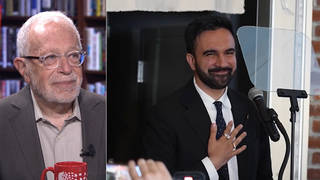
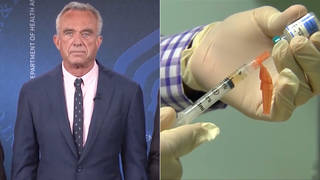
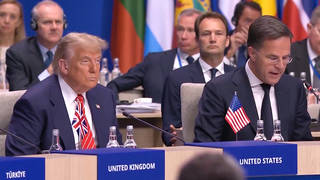

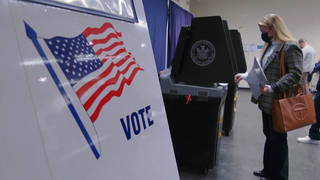
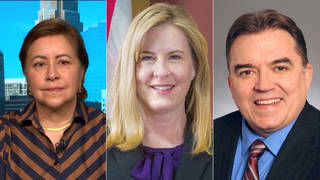

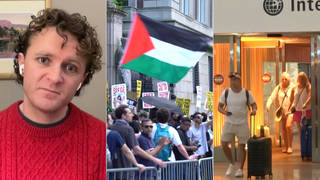

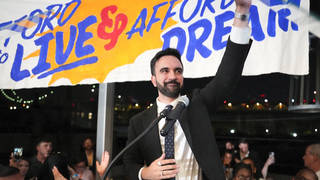
Media Options